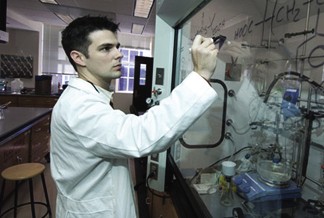
Professor Sumerlin will receive $50,000 to continue his research in Polymer Science. (Photo courtesy of SMU)
Professor of Chemistry Brent Sumerlin has been named a 2010-12 Alfred P. Sloan Research Fellow, according to a press release. With this grant of $50,000 for more than two years of research, comes the possibility that diabetics could automatically have insulin delivered to their systems.
Sumerlin is one of 118 early-career scientists and scholars who show outstanding promise. The Sloan Research Fellowship recognizes distinguished performance and “unique potential to make substantial contributions to their field,” according to the release.
Sumerlin, 33, said he will continue his studies with five doctoral students, two undergraduate students and one post-doctoral research assistant. With the help of this team, Sumerlin is attempting to fuse the fields of polymer, organic and biochemistries to develop materials with composite properties.
Sumerlin explained in a phone interview that this is different from a typical grant. The process began in September 2009, he estimated. He was nominated by the provost, supported by experts in the field of polymer chemistry. After the Sloan Foundation reviewed everything, he was selected.
The fellowship is “really fortunate because it basically supports the research I want to do. And so, you could say that I’ve already started it because it’s supporting ongoing research in my lab,” he said.
His team has been finding how nano-scale polymer particles can come apart—this technology could be an automatic treatment solution for diabetics, by releasing insulin into the body when a person has dangerous levels of glucose in the bloodstream.
Miranda Dunn, an SMU senior and type 1 diabetic, looks forward to Sumerlin’s research and hopes that he will have success.
“I’m just glad that people are continuing to do the research and support the research [for diabetes],” she said.
Sumerlin is also looking into putting these particles back together after separating. The chemistry professor believes this technique could be used to construct materials that are self-repairing, such as a plane repairing its coating after in-flight damage.
Sumerlin will stay on campus for his research and will obtain his funding this April.
The Sloan Research Fellowships were established in 1955. In selecting the recipients, they look for researchers who show “the most outstanding promise of making fundamental contributions to new knowledge,” according to the release.
Thirty-eight Sloan fellows have been awarded the Nobel Prize.
Sumerlin has been on the SMU campus since 2005, after receiving his doctorate at the University of Southern Mississippi in 2003 and acting as assistant professor at Carnegie Mellon University.
He was awarded a National Science Foundation Faculty Early Career Development Award in 2008 for exemplifying the role of teacher-scholars.








